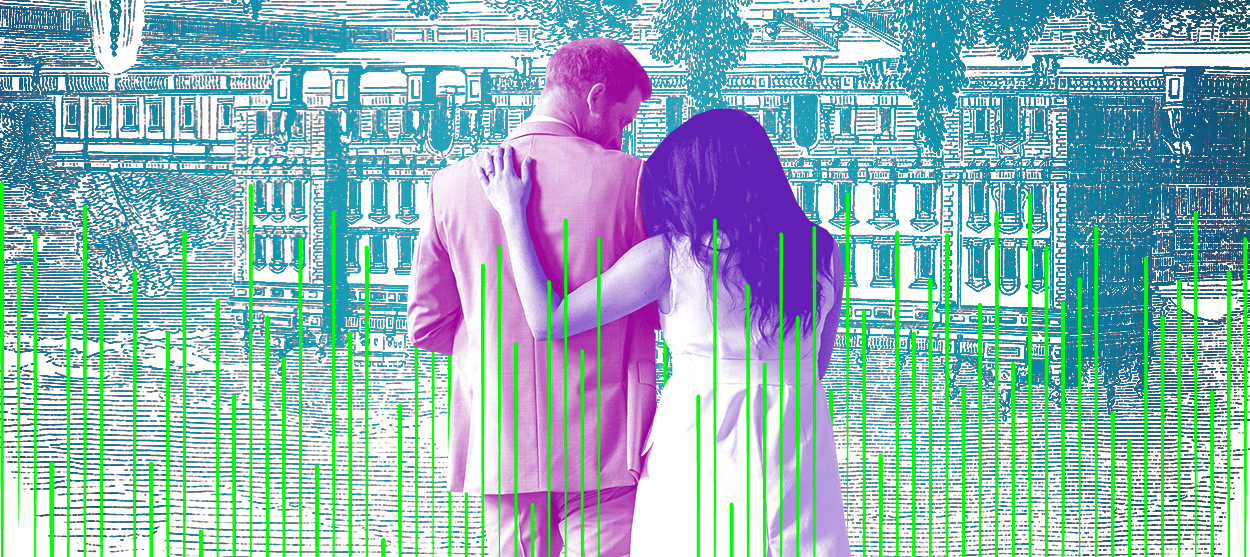The modernization of Prince Harry
Can he and Meghan Markle "unbundle" royal-ness?


A free daily email with the biggest news stories of the day – and the best features from TheWeek.com
You are now subscribed
Your newsletter sign-up was successful
"I don't believe that born a prince must mean I sacrifice my soul, my hopes, desires, all that makes me, me. Instead I should be free to choose my path."
These are the words of a fictional Prince Harry in King Charles III, a play written by Mike Bartlett which debuted in 2014. But they sound like something the real Harry could say today. Bartlett's play has aged well.
Prince Harry and Meghan Markle, the Duke and Duchess of Sussex, released a bombshell statement last week announcing their plan to step back as "senior members" of the British royal family, stating their desire to split time between the United Kingdom and Canada, to become "financially independent," and to have greater control over their schedules, media presence, and engagements.
The Week
Escape your echo chamber. Get the facts behind the news, plus analysis from multiple perspectives.

Sign up for The Week's Free Newsletters
From our morning news briefing to a weekly Good News Newsletter, get the best of The Week delivered directly to your inbox.
From our morning news briefing to a weekly Good News Newsletter, get the best of The Week delivered directly to your inbox.
The decision was startling to many, and its implications are still uncertain. Prince Harry and Meghan have said that they intend to "carve out a progressive new role within" the British monarchy — but they're holding onto their titles, and Harry has not removed himself from the line of succession. Their decision to step away from the royal family has raised a lot of conjecture on the part of pundits and writers, who have suggested that familial coldness, a venomous press, and racism all could have contributed to the couple's decision to pull back.
But Harry and Meghan are lucky this was even a choice for them. It's a mere matter of birth order that gave Harry the flexibility to determine how he wants to embrace (or reject) his royal responsibilities. For his older brother Prince William, this will never be an option.
That said, had Harry lived a generation or two ago, his current choice may still have been impossible, despite his position as sixth in line to the throne.
For Harry, birth determines, in large part, who he is. As a prince, Harry was born with a set of responsibilities and privileges, debts and duties, that he could not shirk. His identity and self were never only his. He would always be part of the royal family — and thus defined by an entity that existed beyond and outside himself. He would always be beholden to his country, and to the crown.
A free daily email with the biggest news stories of the day – and the best features from TheWeek.com
But this is a very old-fashioned idea, one that few people espouse in our democratic age. There are only 40-some monarchies left in the world, which means that Prince Harry is part of a rare ruling class, built on aged ideals regarding tradition and nobility. The royal family is more fragile than it used to be, both as its family members change and age, and as the world changes around it. Perhaps the principles and expectations Harry received as a child felt outdated or unreasonable as he grew older. Why should birth dictate who we are and what we do? Most Americans (probably Meghan included) were raised on a diet of Disney films and pop culture that urged us to "be whatever you want to be," to eschew family expectation or tradition in the name of self-actualization.
Tara Isabella Burton has noted the growth of what she calls "intuitionalism" in our time, a spiritual worldview which suggests that our personal feelings are the most reliable guide to truth — and that unresolved pain or unexpressed desires are often the source of evil and injustice in our world. These ideas are often woven subtly into cultural messaging and consumer products. But they reinforce "opt-out society," which sees collectivity and community as imposing and repressive. The anti-institutional bent of Meghan's American roots may have influenced Harry — but it's also very possible that Harry embraced certain iconoclastic tendencies, along with more modern conceptions of self-definition, long before they became a couple.
Once we've embraced these ideas, however, it's also inevitable that we begin seeking to curate our existence, molding it into whatever we see as our "brand," our chosen identity. This is perhaps one of the most interesting aspects of Harry and Meghan's decision: As Caity Weaver and Elizabeth Paton wrote for The New York Times, Harry and Meghan want to "relinquish some (public) lifestyle funding in order to be less beholden to the strict protocol and de facto traditions of the royal family without sacrificing titles, influence, or access."
Harry and Meghan seem to be attempting to "unbundle" royal-ness — picking out the parts they don't like, keeping the rest — in order to fit their own vision for themselves and their identities going forward. And while a lot of younger people might view this as a form of self-care, it may also feel unjust and frustrating to others within the royal family (Prince William among them) for whom this sort of unbundling is impossible — and on whom the burdens of Harry's exodus will now fall.
It's impossible to know how much of this decision is the Royal Family's fault — if they had sharply condemned the racism that Meghan suffered from the U.K. press, and welcomed her more fully into their midst, perhaps Harry and Meghan would have shaped a brand that fit within the parameters of their family. Claims that the royal family is "poisonous" or "Machiavellian" seem hyperbolic, but that does not mean Harry's family displayed the compassion or hospitality they should have.
For these reasons and more, many have applauded Harry and Meghan's decision to "consciously uncouple" from the royals. But even though Harry and Meghan's departure for Canada may not have a huge impact on the crown now, their decision to "opt out" could have huge implications, down the line, for the precedent it sets. What if, for instance, William and Kate's oldest child, Prince George of Cambridge, pursued a similar tactic? How do you keep the monarchy alive if people can choose how, when, and whether they will accept their birth and all it entails? Maybe you don't.
Most of us are lucky enough to get away with self-curation, with the unbundling of various religious and social experiences, without any drastic consequences. But even for a working-class or middle-class American (perhaps especially for these groups), loss of community and institutions can leave a gaping hole, a sharp loneliness. Many of us realize with time that we are not just atomistic individuals in pursuit of self-actualization, but that our context and history have meaning and significance. Only time will tell if Harry and Meghan will decide the same.
Want more essential commentary and analysis like this delivered straight to your inbox? Sign up for The Week's "Today's best articles" newsletter here.
Gracy Olmstead is a writer and journalist located outside Washington, D.C. She's written for The American Conservative, National Review, The Federalist, and The Washington Times, among others.
-
 Samurai: a ‘blockbuster’ display of Japanese heritage
Samurai: a ‘blockbuster’ display of Japanese heritageThe Week Recommends British Museum show offers a ‘scintillating journey’ through ‘a world of gore, power and artistic beauty’
-
 BMW iX3: a ‘revolution’ for the German car brand
BMW iX3: a ‘revolution’ for the German car brandThe Week Recommends The electric SUV promises a ‘great balance between ride comfort and driving fun’
-
 Munich Security Conference: a showdown between Europe and Trump?
Munich Security Conference: a showdown between Europe and Trump?Today’s Big Question Report suggests European leaders believe they can no longer rely on the US for military support – but decoupling is easier said than done
-
 Epstein files topple law CEO, roil UK government
Epstein files topple law CEO, roil UK governmentSpeed Read Peter Mandelson, Britain’s former ambassador to the US, is caught up in the scandal
-
 Iran and US prepare to meet after skirmishes
Iran and US prepare to meet after skirmishesSpeed Read The incident comes amid heightened tensions in the Middle East
-
 Israel retrieves final hostage’s body from Gaza
Israel retrieves final hostage’s body from GazaSpeed Read The 24-year-old police officer was killed during the initial Hamas attack
-
 China’s Xi targets top general in growing purge
China’s Xi targets top general in growing purgeSpeed Read Zhang Youxia is being investigated over ‘grave violations’ of the law
-
 Panama and Canada are negotiating over a crucial copper mine
Panama and Canada are negotiating over a crucial copper mineIn the Spotlight Panama is set to make a final decision on the mine this summer
-
 Why Greenland’s natural resources are nearly impossible to mine
Why Greenland’s natural resources are nearly impossible to mineThe Explainer The country’s natural landscape makes the task extremely difficult
-
 Iran cuts internet as protests escalate
Iran cuts internet as protests escalateSpeed Reada Government buildings across the country have been set on fire
-
 US nabs ‘shadow’ tanker claimed by Russia
US nabs ‘shadow’ tanker claimed by RussiaSpeed Read The ship was one of two vessels seized by the US military
